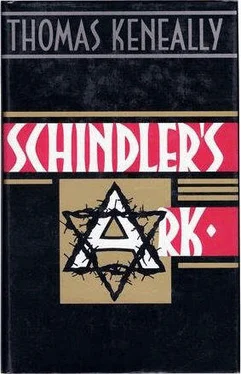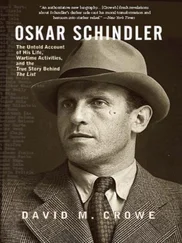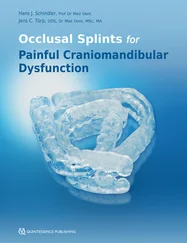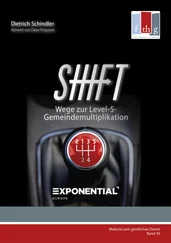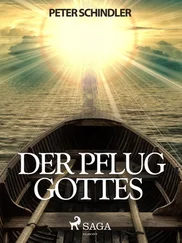It was Gebauer, of course, who would have made the toast, saying he would not give them governments, armies or potentates: instead he would give them the enamel factory of their good friend Oskar Schindler. He did so because if the factory prospered, there would be more parties, parties in the Schindler style, the best parties you could imagine.
But after the toast had been drunk, the talk turned naturally to the subject that bemused or obsessed all levels of the civil bureaucracy. The Jews.
Toffel and Reeder had spent the day at Mogilska Station supervising the unloading of Poles and Jews from eastbound trains. These people had been shipped in from the Incorporated Territories, newly conquered regions which had been German in the past. Toffel wasn’t making a point about the comfort of the passengers in the Ostbahn cattle cars, although he confessed that the weather had been cold. But the transport of populations in livestock carriages was new to everyone, and the cars were not as yet inhumanly crowded. What confused Toffel was the policy behind it all.
There is a persistent rumor, said Toffel, that we are at war. And in the midst of it the Incorporated Territories are too damn simon-pure to put up with a few Poles and a half-million Jews. “The whole Ostbahn system,” said Toffel, “has to be turned over to delivering them to us.”
The Abwehr men listened, slight smiles on their faces. To the SS the enemy within might be the Jew, but to the Canaris the enemy within was the SS.
The SS, Toffel said, had reserved the entire rail system from November 15 on.
Across his desk in Pomorska Street, he said, had crossed copies of angry SS memoranda addressed to Army officials and complaining that the Army was welching on its deal, had gone two weeks over schedule in its use of the Ostbahn. For Christ’s sake, Toffel asked, shouldn’t the Army have first use, for as long as it liked, of the railway system? How else is it to deploy east and west? Toffel asked, drinking excitedly. On bicycles?
Oskar was half-amused to see that the Abwehr men did not comment. They suspected Toffel might be a plant instead of simply being drunk. The surveyor and the man from the Armaments Inspectorate asked Toffel some questions about these remarkable trains arriving at Mogilska.
Soon such shipments wouldn’t be worth talking about: transports of humans would become a clich’e of resettlement policy. But on the evening of Oskar’s Christmas party, they were still a novelty.
“They call it,” said Toffel, “concentration. That’s the word you find in the documents. Concentration. I call it bloody obsession.”
The owner of the jazz club brought in plates of herring and sauce. The fish went down well with the fiery liquor, and as they wolfed it, Gebauer spoke about the Judenrats, the Jewish councils set up in each community on the order of Governor Frank. In cities like Warsaw and Cracow the Judenrat had twenty-four elected members personally responsible for the fulfillment of the orders of the regime. The Judenrat of Cracow had been in existence for less than a month; Marek Biberstein, a respected municipal authority, had been appointed its president. But, Gebauer remarked, he had heard that it had already approached Wawel Castle with a plan for a roster of Jewish labor. The Judenrat would supply the labor details for digging ditches and latrines and clearing snow. Didn’t everyone find that excessively cooperative of them?
Not at all, said engineer Steinhauser of the Armaments Inspectorate. They thought that if they supplied the labor squads it would stop random press-ganging. Press-ganging led to beatings and the occasional bullet in the head.
Martin Plathe agreed. They’ll be cooperative for the sake of avoiding something worse, he said. It’s their method—you have to understand that. They’d always bought the civil authorities off by cooperating with them and then negotiating.
Gebauer seemed to be out to mislead Toffel and Reeder by pushing the point, by seeming more passionately analytic about Jews than he really was. “I’ll tell you what I mean by cooperation,” he said. “Frank passes an edict demanding that every Jew in the Government General wear a star. That edict’s only a few weeks old. In Warsaw you’ve got a Jewish manufacturer churning them out in washable plastic at three złoty each. It’s as if they’ve got no idea what sort of law it is. It’s as if the thing were an emblem of a bicycle club.”
It was suggested then that since Schindler was in the enamel business, it might be possible to press a deluxe enamel badge at the Schindler plant and retail it through the hardware outlet his girlfriend Ingrid supervised. Someone remarked that the star was their national insigne, the insigne of a state that had been destroyed by the Romans and that now existed only in the minds of Zionists. So perhaps people were proud to wear the star.
“The thing is,” said Gebauer, “they don’t have any organization for saving themselves. They’ve got weathering-the-storm sorts of organizations. But this one’s going to be different. This storm will be managed by the SS.” Gebauer, again, sounded as if without being too florid about it, he approved of the professional thoroughness of the SS. “Come on,” said Plathe; “the worst that can happen to them is that they’ll get sent to Madagascar, where the weather is better than it is in Cracow.”
“I don’t believe they’ll ever see Madagascar,” said Gebauer.
Oskar demanded a change of subject.
Wasn’t it his party?
In fact, Oskar had already seen Gebauer hand over forged papers for a flight to Hungary to a Jewish businessman in the bar of the Hotel Cracovia. Maybe Gebauer was taking a fee, though he seemed too morally sensitive to deal in papers, to sell a signature, a rubber stamp. But it was certain, in spite of his act in front of Toffel, that he was no abominator of Jews. Nor was any of them. At Christmas 1939 Oskar found them simply a relief from the orotund official line.
Later they would have more positive uses.
The Aktion of the night of December 4 had convinced Stern that Oskar Schindler was that rarity, the just Goy. There is the Talmudic legend of the Hasidei Ummot Ha-olam, the Righteous of the Nations, of whom there are said to be—at any point in the world’s history—thirty-six. Stern did not believe literally in the mystical number, but the legend was psychologically true for him, and he believed it a decent and wise course to try to make of Schindler a living and breathing sanctuary.
The German needed capital—the Rekord plant had been partially stripped of machinery, except for one small gallery of metal presses, enamel bins, lathes, and furnaces. While Stern might be a substantial spiritual influence on Oskar, the man who put him in touch with capital on good terms was Abraham Bankier, the office manager of Rekord, whom Oskar had won over.
The two of them—big, sensual Oskar and squat, elfin Bankier—went visiting possible investors. By a decree of November 23, the bank and safe deposits of all Jews were held by the German administration, in fixed trust, without allowing the owner any right of access or interest. Some of the wealthier Jewish businessmen, those who knew anything about history, kept secret funds in hard currencies. But they could tell that for a few years under Governor Hans Frank, currencies would be risky; portable wealth—diamonds, gold, trade goods—would be desirable.
Around Cracow there were a number of men Bankier knew who were willing to put up investment capital in return for a guaranteed quantity of product. The deal might be an investment of 50,000 złoty in return for so many kilos of pots and pans a month, delivery to begin July 1940 and to continue for a year. For a Cracow Jew, given Hans Frank in the Wawel, kitchenware was safer and more disposable than złoty. The parties to these contracts—Oskar, the investor, Bankier as middleman—brought away from these arrangements nothing, not even deal memoranda. Full-fledged contracts were of no use and could not be enforced anyhow. Nothing could be enforced. It all depended on Bankier’s accurate judgment of this Sudeten manufacturer of enamelware.
Читать дальше
